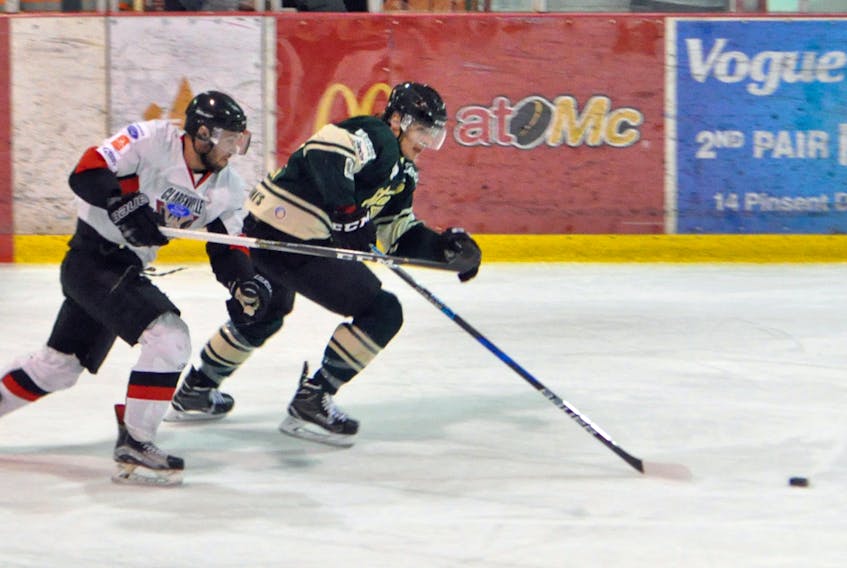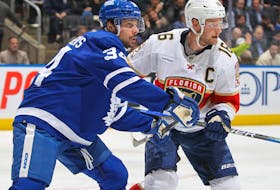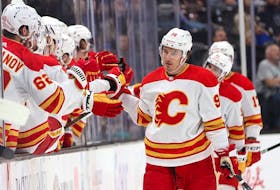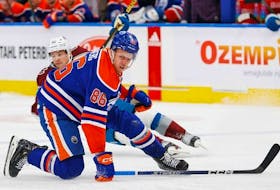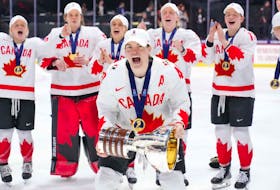GANDER, N.L. — Action taken by Hockey Newfoundland and Labrador (HNL) is receiving mixed reaction in the senior hockey world.
To maintain hockey throughout the 2018-19 season, HNL introduced interlocking play that would see central and east Avalon teams play one another.
The Northeast Eagles missed two scheduled games in the central area and would not be able to make up the games.
The St. John’s Caps stated it would not play the Feb. 9-10 games of the original schedule. The team was willing to make up the games at a later date, but finding ice time before the end of the regular season, Feb. 24, proved challenging.
As a result, HNL has imposed penalties that disqualifies the two teams from participating in the Herder championships.
HNL has confirmed the penalties have been issued, but would not be commenting on the matter.
But Jack Casey, with the team governor for the Caps, had plenty to say about it.
“It is highly unlikely that there will be interlocking play with the east teams next season.”
– Jack Casey
“The players in the east find it difficult to travel to central because of family and work commitments. So, in the history of interlocking play we have never been able to get our full roster to travel, resulting in games being played with 10-12 players,” he said.
Casey also said interlocking format isn’t reflective of the quality of play.
Central teams have paid players, while the Avalon doesn’t. According to Casey, it has furthered its challenges to secure commitments to travel.
“(It’s) a big challenge convincing amateur hockey players to compete against paid players,” he said. “When game results are as one sided as the Grand Falls vs Northeast game before Christmas, the impact on player interest is devastating.”
Grand Falls-Windsor won the game he mentioned 8-2.
Casey said the Caps were never in favour of interlocking play, but with only two teams in central and being pressured by HNL, the Caps reluctantly agreed.
He doesn’t feel the format is working, and if the two leagues are to have a future together, something needs to change.
“It is our hope that the two senior teams in central institutes a non-paid player model so that there can be more senior teams in their region, and that all teams in senior hockey can compete on a level playing field,” he said. “It is highly unlikely that there will be interlocking play with the east teams next season.”
Cataracts
Bryan Blackmore, president of the Grand Falls-Windsor Cataracts, sees the decision as HNL following policy.
“It’s no different than any other type of arrangement that you might make. If it’s not honoured, there should be consequences,” he said. “Because there were definitely were consequences for us as a team.”
Blackmore said the cancelled games resulted in lost revenue, having to compensate for seat holder ticket purchasers, and the cost associated with travel expenses for players.
Furthermore, he said, it shakes the trust of fans.
“We are anxious about maintaining our trust with the fans. It cost money to bring in our players and a significant source of revenue is the fans,” he said. “We used to have 800-900 fans (per game) now are down to half of that, and if it’s a hit and miss situation with teams showing up… we have to make sure the continuity in teams is there.”
When it comes to paying players, Blackmore says it isn’t something that central teams can give up and remain competitive.
“We have to find ways to encourage hockey players to come out here, because otherwise there would be no hockey, there are not enough people,” he said. “Ninety per cent of the province’s population lives on the Avalon peninsula, so you expect the proportion of hockey players to be similar,” he said.
Caribous
Ivan Hapgood, head coach of the Clarenville Caribous, understands both sides of the argument.
Hapgood said Clarenville is prepared to travel, but he understands the cost to travel and securing travel commitments.
And like Blackmore’s comments, Hapgood said it takes fans purchasing tickets to accommodate travel.
“Our fan support isn’t near where it used to be,” he said. “If we had a salary cap to meet this year, we would have been done like dinner long before now.”
Without implementing the interlocking format, he feels there likely would have been no senior hockey in central this season.
“I think the intent (of interlocking play) was to bridge a gap so that a third team can hopefully be found for the next season, so central could continue to have hockey,” he said. “That component has been successful.”
And he commends HNL for doing that, but Hapgood sees the long-term solution as having two self-sufficient leagues.
“We have to keep travelling east because it cuts our budget in half just by doing that,” he said. “Grand Falls-Windsor and Gander has to find another partner or two to create a good league in the local area.
“Having people on buses traveling for weekends, you need 700-900 fans in the buildings to make that (financially) possible, because players aren’t doing that without a paycheque, and right now there aren’t enough fans in the buildings to provide a paycheque.”
Tell us what you think!
Write us a letter to the editor and email it to [email protected]. Be sure to include a name, address and daytime telephone number where the author can be contacted. Letters should be no more than 300 words.

